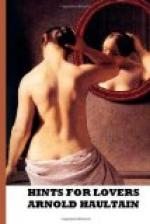A more durable domestic affection is not built up from the pristine foundation of total ignorance than from that of a partial acquaintanceship.
The American Elizabeth Patterson, before she became Madame Jerome Bonaparte, could write, “I love Jerome Bonaparte, and I prefer to be his wife, were it only for a day, to the happiest union.”
The continentalized Madame Jerome Bonaparte, twenty-six years after she had ceased to be Miss Elizabeth Patterson, could write “Do we not know how easily men and women free themselves from the fetters of love, and that only the stupid remain caught in these pretended bonds?” (1) After all,
Little do any couple know of each other before marriage. Besides Does not a delightful romance envelope the nuptials of strangers? At all events, even if precaution is a foe to impulse, few will be found to deny that
Strangeness is by no means inimical to passion. Perhaps, then, Fathers and mothers and uncles and aunts can form a better judgment as to the suitability and adaptability to each other of two young, ardent, and headstrong boys and girls can these themselves; since
Fathers and mothers and uncles and aunts know full well that impulse and passion often prove materials too friable for the many-storied fabric of marriage. At all events,
The French mode of contracting a marriage precludes the possibility of perilous and precocious affairs of the heart. Perhaps
The mistake that ardent and headstrong boys and girls make is in thinking that impulse and passion are the keys of Paradise. Their Elders know that impulse and passion are sometimes the keys of Purgatory.
Prudence and prevision are not keys to any supernal (or infernal) existence; they are merely guide-books to a terrestrial journey. At all events, it is significant that (which might be added as a lemma)
Widows rarely choose unwisely!
(1) Quoted by C. de Varigny in the “Revue des Deux Mondes” of January the 15th, 1893.
* * *
Over that much-bethought-of, much-surmised-about-thing, a proposal of marriage, every young woman weaves a pre-conceived halo of romance, but
In nineteen cases out of twenty a proposal is either unexpected or disappointing; that is,
Many a girl has almost held her breath with anxiety as she saw the great question coming; then almost cried with vexation at the way it came. For, often,
Either the wrong man proposes or the right man proposes stupidly.
The woman looks for ideal surroundings, a dramatic situation, and impassioned and poetic utterance; usually,
The man seizes a commonplace opportunity and—stutters. Probably,
The ideal proposal occurs only in novels. And yet—and yet—
Perhaps after all the real proposal is more complimentary to woman than is the ideal; at least perhaps
The aberration and obfuscation of the man is proof once (i) of her potency and (ii) of his sincerity.




